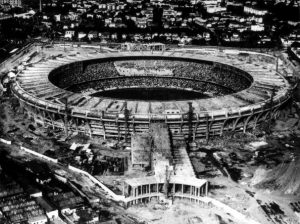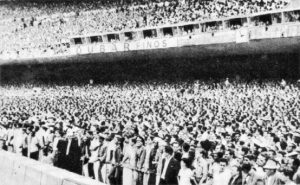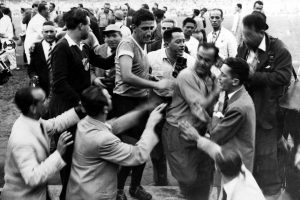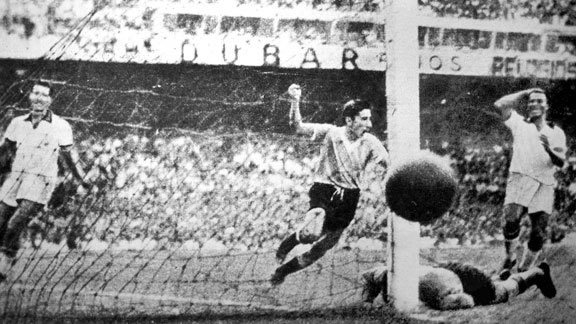It was Maracanazo on 16th July 1950 at Maracana when Brazil was handed a sombre loss by Uruguay in the final of the World Cup. It was regarded as a ‘National Disaster’ in Brazil often compared to the bombing of Hiroshima. The Maracanazo impacted on the country’s self-esteem and effectively paralysed the country emotionally and psychologically.

Brazil and Football are interdependent. Any study of Football history reveals how this ‘beautiful game’ occupied a key position in the cultural identity of a nation. The British introduced Football in Brazil in 1894, and within 50 years of its introduction, Football became its favourite pastime, almost a religion. As a result, Brazil was chosen by FIFA as the host of the World Cup in 1950, only 56 years after the first Brazilian football match took place.
When Brazil won the rights to host the World Cup, the government decided to construct a new stadium for the tournament. Despite controversy over cost, construction of the stadium began in August 1948. Though officially called Estádio Mário Filho, in memory of journalist Mario Filho who was in strong favour of its construction, the stadium was nicknamed Maracana based on the local river of the same name flowing nearby.
Although the construction of the Maracana was not completely finished until 1965, still it was officially opened on 16th June 1950 with a friendly match between Rio de Janeiro and Sao Paulo. Eight days later, it hosted the opening match of the 1950 World Cup between Brazil and Mexico which Brazil won by 4-0. It would go on to host four more matches in the first round group stage and a further two in the second round stage followed by the deciding match between Brazil and Uruguay.

Brazil won the first round matches with ease and just dominated over Sweden and Spain to get a pole position. This was the only World Cup which did not have a final and Brazil only needed a draw against Uruguay to emerge as the world Champions.
The Brazilians were ecstatic to have their country in the final round and totally went berserk before the match. The fact that the 1950 World Cup was the first since the twelve-year interruption caused by World War II further contributed to the excitement. A special samba, named ‘Brazil the Victors’, was rehearsed in preparation for the inevitable triumph of the host. The Mayor of Rio de Janerio, Angelo Mendes de Moraes lauded the Brazilian team before the final by his speech, “You, players, who in less than a few hours will be hailed as champions by millions of compatriots! You who have no rivals in the entire hemisphere! You who will overcome any other competitor! You, who I already salute as victors!” Even FIFA President Jules Rimet prepared a congratulatory speech for Brazil to address at the award ceremony. Famous midfielder Zizinho later revealed “The day before the game I signed more than two thousand autographs with the words ‘Brazil, champions of the world’.”
With almost 2,00,000 attendance, Maracana was decorated to host the largest-ever Football final clash. After a scoreless first half, Brazilian striker, Friaca scored the first goal in the 47th minute. Maracana erupted in joy and it seemed that Brazil was destined to win the Cup. But in the 66th minute, Uruguayan winger Juan Schiaffino scored a goal to even the score. The Brazilians did not worry as they needed only a draw. But when another Uruguayan winger, Alcides Ghiggia, scored the winner in the 79th minute, Maracana was silenced. Brazil were the losers and they could not believe it.

The consequences of shocking defeat were many. It started with a suicide of a distressed fan just after the final whistle. Three other people died from heart attack inside the stadium. In the midst of distress, Uruguay was handed the trophy without an award ceremony. The scene was more horrific outside the stadium. A group of Brazilian fans knocked over a bust of the Mayor in protest against his premature congratulatory message. People showed anger, annoyance and frustration. Rumours came that Flavio Costa, the Brazilian coach had to exit the stadium in the disguise of a nanny.
However, the person to be the greatest sufferer was Moacir Barbosa, the goalkeeper of the Brazilian team. Barbosa faced endless criticism from Brazilians for allowing two opposing goals and also was the victim of mockery for being black.
The defeat influenced the Brazilian team too as they did not participate in matches for two years or play in the Maracana for four years following the World Cup. The only silver lining of this tragedy was that Brazil disowned their white dress forever and adopted the famous yellow shirts with which they won the highest feat five times.




